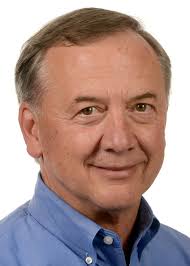Overcash: In Flavor Ban, Loveland Council Losing Focus
- News This Week opinion
- December 15, 2020
- 6 minutes read

Credit: Loveland, Colorado
How did the Loveland City Council go from discussing teen vaping to a ban on dozens of products legal for adult purchase? To get to the root of this controversy, I’ll refer to two positions regarding choice and responsibility.
The first position: As an adult, I can think for myself and make informed decisions. My body, my choice.
The second position: Adults are not capable of making good choices. We need to protect people from themselves.
We acknowledge alcohol and tobacco abuse lead to health issues. Yet society has decided to handle these products through health education and access restrictions, while respecting adults’ personal choices. Bans create black markets, and history has demonstrated suppliers will always find ways to provide what consumers want. Decreasing demands works better than decreasing supply.

On Dec. 4, the House of Representatives voted for national marijuana legalization. The law doesn’t claim marijuana is free from health concerns, but that informed adults should be free to make a personal choice. Local governments will create access restrictions to protect kids, as they do with alcohol and tobacco.
Campaigns to ban or promote certain products often have catchy names and slick marketing strategies, and they are nationally organized and locally deployed for maximum effect. And there is nothing wrong with executing a well-developed plan.
However, the truth is often lost in the battle for public favor. The proven way to win is to use emotion, along with facts and logic selectively chosen to justify a position. Obfuscation is common. Campaign workers get paid to win. This is the nature of competition in the marketplace of ideas, each side using their power to shout their position. Citizens must sort out what is true and false.
Former New York City Mayor Michael Bloomberg and others have championed many “protect people from themselves” initiatives, including regulations on salt, firearms, vaping, tobacco, and even soft drink serving sizes. Bloomberg also supports the nonprofit “Tobacco-Free Kids.” Perhaps a margarita ban is on the horizon, given the drink’s combination of alcohol, sugar, and salt.
Most of these issues are handled by national or state bodies, such as the FDA, to avoid the unintended consequences and confusion that might result from a patchwork of local bans. Non-federal government bodies do have a role to play, however, in the distribution and sale of select products such as alcohol, tobacco, and — if nationally legalized — marijuana.
When the vaping topic first came before the Loveland City Council, the focus was on limiting access for kids without impeding adults’ freedoms, similar to restrictions on alcohol and tobacco.
I believe council members became wrapped up in anti-tobacco emotion without considering the very real impact a flavored tobacco ban will have locally. While the intent of the ban is to protect our kids, the task force and council have not considered its harsh impact on over 60 Loveland small businesses, their hundreds of employees, and our adult citizens’ freedom of choice. Any serious consideration would reveal these impacts, and council has fortunately delayed further discussion pending a more thorough investigation.
It is apparent this vaping debate has more to do with ideology than Loveland’s kids, given the recent false advertisements accusing three council members by name of being “for Big Tobacco” at the expense of our children. These advertisements were developed and paid for by Tobacco-Free Kids.
Yet every member of the council has clearly supported access restrictions for minors for tobacco, alcohol, and vaping products. The real challenge is how we can do so without impeding Loveland businesses, and without frustrating thousands of Loveland citizens who legally purchase these products. An outright ban is an issue for the FDA.
Councilor Wright bought us some time to consider all factors with a delay until February 2021. I believe an amendment to the proposed ordinance would be in the best interest of Loveland citizens. This amendment would include:
• License requirements for retail outlets.
• A minimum purchasing age of 21.
• An active enforcement policy, including penalties for violation.
• No restrictions on existing flavored tobacco products.
• Limiting sales to age-restricted stores and age-restricted partitions of large stores.
I believe in adults’ freedom of choice and protecting our kids.
Don Overcash is Loveland’s mayor pro-tem. He represents Ward IV on the City Council.